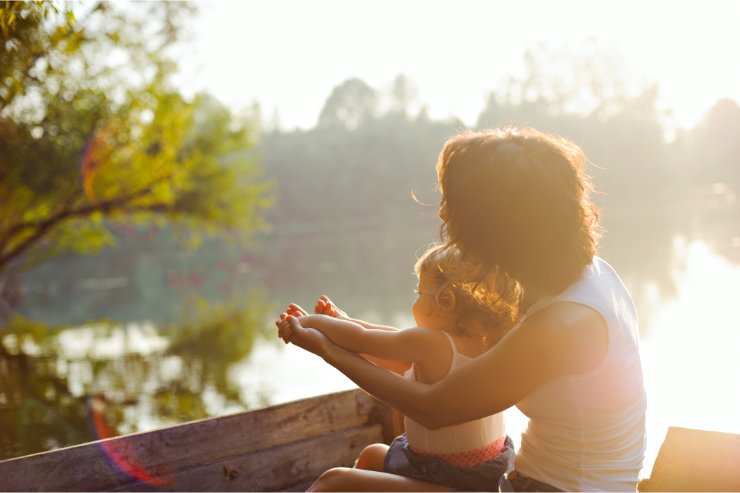 On a rainy afternoon not too long ago, I took the kids to grab a bite to eat at the large food warehouse near our house. We were all a bit stir crazy from being cooped up, so the seven of us braved the hellish weather with nary a yellow slicker or umbrella.
On a rainy afternoon not too long ago, I took the kids to grab a bite to eat at the large food warehouse near our house. We were all a bit stir crazy from being cooped up, so the seven of us braved the hellish weather with nary a yellow slicker or umbrella.
(In our family, slickers, rain boots, and umbrellas are for wimps. Just kidding, slickers, rain boots and umbrellas are for those people who can find them.)
After our nutritious meal of hot dogs and pizza followed by PowerAide chasers, I corralled my small herd of children toward the exit, but we were stopped by the intense monsoon still busy maiming the parking lot. We stood in the store’s doorway for a few minutes watching people get doused while dashing to their cars when we saw a woman—maybe in her early sixties—pushing a cart and struggling to breathe. She had a cannula pumping oxygen into her nose and it was attached to a tank she had strapped to her waist.
I watched as she took deep breaths, but still struggled for air—even with the assistance from the oxygen. Her shoulders sagged when she saw the rain pelting and I could almost hear her think, “How am I going to make it to the car?”
She took another deep breath and used her weight to push her buggy full of groceries, but before she got away from me, I tapped her on the shoulder.
“Why don’t you go get your car and my kids and I will load your groceries for you?” I said. “I have lots of helpers.”
The woman took another gasp of breath and the corners of her mouth crept upward—hitting the plastic wire sitting right above her upper lip.
“Thank you,” she said, heaving deeply, and she hobbled off to get her vehicle.
I returned to my own grocery cart full of kids and my son said, “That was really nice, Mom.”
I nodded a thank you but I have to confess, I was feeling pretty good about myself. I was patting myself on the back for being the Good Samaritan of the day and I was thinking all kinds of righteous thoughts about the importance of going out of our way to help those in need.
The rain was still showering sheets when the woman pulled her vehicle up to us.
“Come on, kids,” I yelled. “We have to work quickly if we don’t want to get soaked.”
I darted to the car, with a few kids following behind me, and when I pulled open the door, I was almost knocked over by the smell of cigarette smoke.
“So that’s why she can’t breathe,” I thought as I threw frozen food into her trunk. “She probably has emphysema or COPD from years of smoking. She did this to herself.”
In a second, the good desire I had to help a fellow woman in need completely evaporated because I made a snap judgment with very limited information. In a second, the compassion I had for the woman, my desire to help her because she was in need, lessened.
After I loaded my children safely into our van and started the trek home, I reminded myself I don’t really have any information about the woman’s life.
I don’t know if the car she drives is filled with smoke because she takes drags from Camel cigarettes all day long.
I don’t know if she smokes because she has terrible anxiety and cigarettes are one way she’s found to cope with life.
I don’t even know if the car she drives is in fact hers. Maybe her husband or child smokes?
Here’s what I do know: I do know the woman with the oxygen tank is very sick and that is reason enough to help her.
St. Alphonsus Liguori says, “We should all stop scowling at the sins of other people. Rather, we should consider that we may be worse spiritually than they are and should say, ‘Lord, if You had not helped me, I should have done worse.”
It is not enough, however, to simply avoid condemning others for their sins like this great saint encourages. I must also rectify my tendency to compare my “superior” sins over the evils of others. I hate to think I’m like that Pharisee, who stood in temple and said, “God, I thank you that I am not like other people—robbers, evildoers, adulterers—or even like this tax collector. I fast twice a week and give a tenth of all I get” (Luke 18:9-14).
The truth? I am more like the Pharisee than I am the tax collector, who stood at a distance, pleading for God to have mercy on him.
I remind my children at least twenty times a day to mind their own business, to take care of themselves, to stay on their side of the street, and to keep their own sandbox clean.
“You don’t need to worry about him,” I say ad nauseam. “You have a full time job with you.”
Perhaps I should heed my own advice.
If I maintain a focus on my own sinfulness—which let’s face it, is deep and wide—I will have less time to behave like the Pharisee and more time to rend my garments and beat my chest as I beg, “God, have mercy on me, a sinner.”














